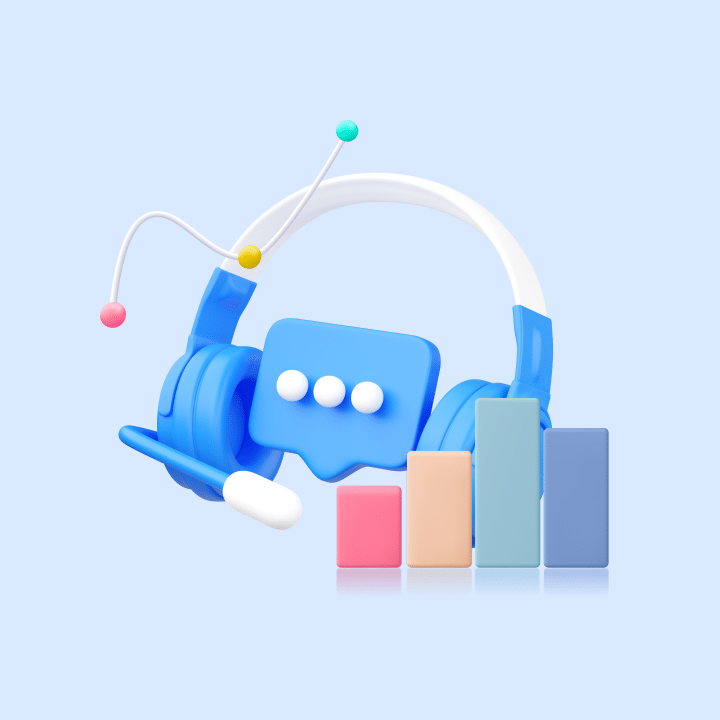A few years ago, getting help inside an app was frustrating. Tap “support,” and you’d be pushed to a browser form or an email thread, forced to explain the issue all over again.
Helpshift changed that. With its mobile Software Development Kits (SDKs), in-app chat, and AI bots that hand off to human agents when needed, it kept support right where users wanted it – inside the app. No wonder it became a go-to for gaming and mobile-first businesses.
But as those businesses grew, two pain points emerged.
- Helpshift’s issue-based pricing often made costs unpredictable as ticket volumes increased.
- Its heavy emphasis on in-app support left gaps once customers began reaching out over email, chat, or phone.
At that stage, many teams start weighing Helpshift alternatives that can handle both app experiences and broader, multichannel support.
That’s what this guide is here to help with. Below, you’ll find the 10 best Helpshift alternatives in 2025 – what they cost, what they’re good at, and which ones can still give you that in-app SDK experience Helpshift is known for.
Table of Contents
- Why look for a Helpshift alternative?
- 10 best Helpshift alternatives compared
- Features to look for in Helpshift alternative
- Select the right Helpshift alternative
- Frequently asked questions (FAQs)
Why look for a Helpshift alternative?
Helpshift has a lot going for it, especially if you’re running a mobile-first business and need support embedded directly into your app. But when you scan user reviews, a few recurring challenges come up. These are the main reasons teams start exploring Helpshift alternatives:
1. Pricing that scales unpredictably
Helpshift uses an issue-based pricing model (plans now start at $150/month with 250 free issues/month). That works when your volumes are steady, but once your app takes off, the costs can climb quickly.
As one reviewer put it: “The prices are a bit high. There is no live chat customer support when you have issues.” For smaller teams, this model can feel especially restrictive.
2. SDK challenges and feature gaps
The SDK is a big selling point, but it isn’t frictionless. Teams mention running into issues when updating to newer versions, with one reviewer noting: “We want to update current SDK to the new version to use new features but the new one doesn’t have offline FAQ feature.” Others pointed out that, like many external SDKs, integration requires extra QA effort to make sure no new bugs creep into the app.
3. Integration and QA overhead
Even though Helpshift’s SDK is marketed as simple to implement, teams report hidden complexity during updates and QA cycles. Every new build needs careful testing to avoid introducing bugs, which can slow down release cycles – a real pain for app developers shipping updates frequently.
“As with almost all external SDKs, the integration, despite being easy, presents challenges. QA teams have to be extra careful with the build review, to make sure that no new bugs are being introduced into the game because of Helpshift.”
4. Reliability concerns
Support platforms are only as good as their stability. Some reviewers reported freezes, duplicate messages being sent to customers, and chat redistribution breaking mid-conversation. In industries like gaming, where response time is tied directly to player retention, even minor technical glitches can have a big business impact.
“At times, the platform freezes, sends duplicate messages to the client, and even the redistribution of chats stops happening automatically.”
5. Usability and customization
Several users feel the interface hasn’t kept up with modern design expectations, and that basic customization options are missing. They also highlighted that tabs and demand queues could be organized better for easier navigation.
“The design also appears to be a little outdated. There may be some option to change the background, colors, fonts of the letters that make the tool more dynamic. The way to filter demand queues could be more elaborate, so we could organize the tool more in a visual way.”
10 best Helpshift alternatives compared
A quick glimpse at the top 10 alternatives to Helpshift.
| Software | Pricing (2025) | In-app SDK support | Key strengths |
|---|---|---|---|
| Hiver | Free plan; Paid from $19/user/mo | ❌ No | Inbox-like UI, 24×7 support, 100+ integrations, AI Copilot, multichannel (email, chat, social, WhatsApp) |
| LiveAgent | From $15/agent/mo | ❌ No | Affordable, call center + email + chat, social integrations |
| Help Scout | From $50/user/mo | ❌ No | Clean shared inbox, Beacon in-app widget, great docs/self-service |
| Zoho Desk | From $7/month per user | ✅ Yes (via Zoho SalesIQ “Mobilisten” SDK) | Tight integration with Zoho apps, AI assistant Zia, customizable workflows |
| Zendesk | From $55/agent/mo | ✅ Yes (Messaging SDK) | Mature omnichannel suite, AI add-ons, advanced automations |
| Kustomer | From $89/user/mo | ❌ No | Customer timeline view, CRM-style context, AI + automation |
| Intercom | From $29/seat/mo | ✅ Yes (iOS/Android SDKs) | Market leader for in-app messaging, AI chatbot “Fin,” great onboarding flows |
| Drift | Custom pricing (starts ~$2K/mo) | ❌ No | Conversational marketing + ABM chat, sales integrations |
| Freshdesk | Free plan; Paid from $15/agent/mo | ❌ No | Omnichannel, automations, marketplace integrations |
| Salesforce Service Cloud | From $25/user/mo | ✅ Yes (via SDKs) | Deep CRM integration, AI via Einstein, customizable workflows |
1. Hiver: Modern AI-powered Helpshift alternative with 24×7 support
Most help desks come with a hidden tax: the time it takes for your team to adjust. New dashboards, new processes, endless training – all before you can get back to helping customers. Hiver, a modern AI-powered customer support platform, avoids that slowdown with an inbox-like interface that feels instantly familiar to your team.
It’s the inbox they already know, upgraded for collaborative support across every major channel – email, live chat, phone, social, and WhatsApp – so agents can manage conversations without hopping between tools.
And while Helpshift’s AI is largely tied to chatbots, Hiver embeds AI across the lifecycle: Copilot drafts responses and adjusts tone, AI Agents handle triaging, automate tagging and follow-ups, and Insights predict SLA risks and workload bottlenecks.
Also, Helpshift focuses mainly on in-app support with an issue-based pricing model that can get expensive as ticket volumes rise. Hiver gives you predictable per-agent pricing and covers every major channel.

Key features
- Shared inbox: Manage group emails like support@ or info@ in an inbox-style interface. Each conversation has a clear owner, so nothing slips through the cracks. Internal notes, shared drafts, and real-time updates keep teammates aligned.
- AI Copilot: Works alongside agents from the first message to resolution. It pulls context from past tickets and knowledge docs, suggests replies in your brand voice, adjusts tone, and summarizes long threads, helping agents respond faster and more consistently.
- AI Agents: Autonomous helpers that take on repetitive tasks. They can answer FAQs, send follow-up reminders, and use AI-powered triage to categorize conversations by urgency, sentiment, or topic – routing them to the right workflow or team without delays.
- AI Insights: Turns every conversation into actionable data. Spot bottlenecks, overloaded teams, and slipping sentiment. Predictive models forecast spikes in ticket volume and flag at-risk accounts before they escalate.

- AI live chat assistant: A 24/7 virtual agent that pulls answers from your help docs and past conversations. It resolves common queries instantly, keeping your queue lighter and customers happy even outside business hours.
- Automation: Automate routing and queue management based on agent skills, availability, or round-robin rules. This prevents overload and ensures customers get timely responses.
- Internal notes & @mentions: Collaborate without clutter. Agents can leave context-rich notes on tickets and tag colleagues across teams to loop in expertise quickly.
- Canned responses: Pre-save replies for common questions to keep responses fast and consistent across the team.
- Custom reports & dashboards: Go beyond default metrics. Build tailored reports – track first-response times by agent, see which customer segments raise the most tickets, or compare CSAT trends across channels.
- Customer feedback (CSAT): Trigger real-time surveys after resolutions or on a schedule. Tie customer sentiment to agent performance and issue type for actionable insights.
- Customer portal: Let customers raise requests, check ticket status, and find answers, all from a dedicated, branded portal. It reduces “status check” emails and boosts transparency.
- Knowledge base: Publish and organize self-serve articles so customers can quickly resolve common issues themselves.
- 100+ integrations: Connect deeply with tools like Salesforce, HubSpot, Jira, Shopify, and NetSuite to keep customer context accessible without switching tabs.
- SLA management: Set and track service-level agreements automatically. Hiver alerts agents when a ticket is close to breaching an SLA, ensuring timely and consistent responses.
What users say about Hiver
- “I love that I can assign emails, leave quick notes for my team, and stay on top of every conversation.”
- “Really helpful in helping our team be able to work more efficiently in unison while not being present with each other.”
- “The mobile experience isn’t as robust as desktop.”
Pricing
Hiver offers the following pricing options:
- Forever free plan with unlimited users and core multichannel features
- Lite: $19/user per month
- Growth: $29/user per month
- Pro: $49/user per month
- Elite: Custom pricing

2. LiveAgent: Affordable Helpshift alternative with chat, email, and built-in call center
LiveAgent is a customer support software that serves as an all-in-one solution for managing customer interactions across various channels. LiveAgent’s core strength lies in its multi-channel ticketing system, which efficiently consolidates customer inquiries from email, chat, phone, and social media into a unified ticketing system.
Unlike Helpshift, LiveAgent has native integrations with payment platforms like Stripe and Braintree, letting support teams handle billing questions directly inside the help desk.
The trade-off is complexity – LiveAgent’s interface can feel crowded, and with over 200 features packed in, new users often face a steeper learning curve before they can unlock its full potential.

Key features
- Real-time chat support: Offer immediate assistance to website visitors, with features like chat routing, canned responses, and chat transcripts.
- Call center integration and VoIP support: Seamlessly handle customer support over the phone, allowing agents to make and receive calls directly from the LiveAgent dashboard. Features include call recordings, call routing, and call scripts.
- Social media monitoring and engagement: Integrate with popular social media platforms, enabling timely responses to customer messages and comments.
- Customization and branding: Customize the appearance of your customer support portal and live chat widgets to align with the brand’s identity.
What users say about LiveAgent
- “The platform is intuitive, user-friendly, and consistently reliable.”
- “Loved the efficiency of LiveAgent documenting notes or comments.”
- “The reporting isn’t as easy as other platforms I have used.”
Pricing
LiveAgent pricing tiers include:
- Small plan: $15/agent/month
- Medium plan: $29/agent/month
- Large plan: $49/agent/month
- Enterprise plan: $69/agent/month
Recommended reading
3. Help Scout: User-friendly Helpshift alternative with shared inbox and knowledge base
Help Scout stands as a comprehensive customer support platform, primarily focusing on streamlining email support, live chat, and knowledge base management within a unified interface.
As a Helpshift alternative, it offers Docs (its knowledge base) tightly integrated into support workflows, so agents can suggest or share answers in just a click.
While designed to mimic an email inbox for ease of use, new users might still need time to fully grasp and efficiently navigate the platform’s features. Help Scout also does not include a native feature for creating Service Level Agreements.

Key features
- Team collaboration tools: Shared inboxes, one-click assignments, and private notes encourage collaborative responses and efficient team coordination.
- Automatic email categorization and assignment: This feature ensures that customer emails are organized and directed to the appropriate team members promptly.
- Beacon for live chat and self-service: Beacon is an AI tool that enables customers to chat in real-time with support agents or access the self-help centre.
- AI Summarize: This AI feature is designed to streamline the process of managing long, back-and-forth customer conversations. It’s particularly useful when multiple team members are involved in a conversation, as it helps them quickly understand the context.
What users say about Help Scout
- “It’s a little on the expensive side, but the value is there.”
- “The shared inbox keeps all client conversations organized in one place.”
- “Could have more functionality in HelpDocs; like team collaboration and article filtering.”
Pricing
Help Scout offers the following pricing plans:
- Free plan
- Standard: $50 per user per month
- Plus: $75 per user per month
Recommended reading
4. Zoho Desk: Value-packed Helpshift alternative with Zoho integrations + SDK
Zoho Desk is a customer service platform designed to enhance customer support efficiency across various channels like phone, email, live chat, SMS, and social media. It centralizes all customer interactions in one place for more contextual and effective communication.
As a Helpshift alternative, it provides SalesIQ’s “Mobilisten” SDK, which not only brings in-app chat but also tracks user behavior inside the app – offering richer context than Helpshift’s SDK.
While offering customization, it’s perceived as less flexible compared to other platforms. Besides, users have reported difficulties with the phone calling feature within Zoho Desk.

Key features
- Work modes: Offers various ticket views to categorize tickets by priority, due dates, and status, aiding in workload management.
- AI-powered assistant, Zia: Automatically detects ticket sentiment and assigns relevant tags for more accessible identification and categorization.
- Keyword optimization: Converts specific keyword-related posts or messages into tickets, reducing spam and enhancing agent efficiency.
- Ticket assignment: Features an automated Round Robin system for equitable ticket distribution among agents.
What users say about Zoho Desk
- “Integration with other Zoho products and third-party tools was seamless.”
- “Learning curve is a bit steep because it has many configuration options.”
- “APIs are a real plus; they allow us to create tickets directly from our software.”
Pricing
Zoho Desk offers the following pricing options:
- Free plan
- Express: $7/agent/month
- Standard: $14/agent/month
- Professional: $23/agent/month
- Enterprise: $40/agent/month
Recommended reading
5. Zendesk: Enterprise Helpshift alternative with multichannel + SDK support
Zendesk stands out as a prominent helpdesk and customer support software, particularly suited for large organizations. It provides a unified view of customer interactions across various channels like email, live chat, phone, and knowledge base.
As a Helpshift alternative, it stands out with its massive app marketplace, giving teams thousands of pre-built integrations to extend support far beyond mobile SDKs.
However, it is relatively expensive compared to other ticketing solutions, which might be a deterrent for businesses with tighter budgets. Like, for instance, Zendesk costs about 82% more than Hiver. Also, personalized training and assistance from the Zendesk team come at a substantial extra cost, potentially ranging from $1,500 to $2,800.

Key features
- Skills-based routing: This feature intelligently directs customer tickets to agents who have the specific skills and expertise required to handle them effectively.
- Zendesk Explore: Offers a suite of analytics tools with daily updated reports, automated insights, and customizable dashboards, facilitating data-driven decision-making.
- Conditional and custom ticket fields: Enhances the ticketing workflow by allowing administrators to create specific fields in ticket forms. These fields are conditional and customizable, ensuring that agents collect precise and relevant information from customers.
- Zendesk Generative AI: Powered by OpenAI, this feature assists in automatically recommending support articles to customers and deploying bots that can mimic human interactions.
- Macros: Agents can utilize pre-written responses for common customer questions, improving response efficiency and maintaining consistency in communication.
What users say about Zendesk
- “Reporting via Explore provides strong visibility into team performance.”
- “Larger teams sometimes face slow load times, especially when handling high ticket volumes.”
- “Some of the features for non-enterprise plans are a bit limited.”
Pricing
Zendesk offers the following pricing tiers:
- Suite Team: $55/user/month (annual billing)
- Suite Growth: $89/user/month
- Suite Professional: $115/user/month
- Optional add-ons: AI Copilot (~$50/user), workforce management, QA
Recommended reading
6. Kustomer: CRM-style Helpshift alternative for ecommerce and DTC brands
Most support tools treat every new message as a fresh ticket. Kustomer’s strength is its “customer timeline” – a chronological view of everything tied to a customer: past chats, orders, conversations, shipping updates, even CRM data. Instead of starting from scratch each time, your team sees the full story and can step in with the right context.
Unlike Helpshift’s app-centric approach, Kustomer connects support directly with order and account data, making it ideal for ecommerce and subscription businesses.
It can be a pricier option, though (with plans starting at $89 per user/month), so it might be an overkill for smaller teams with tighter budgets.
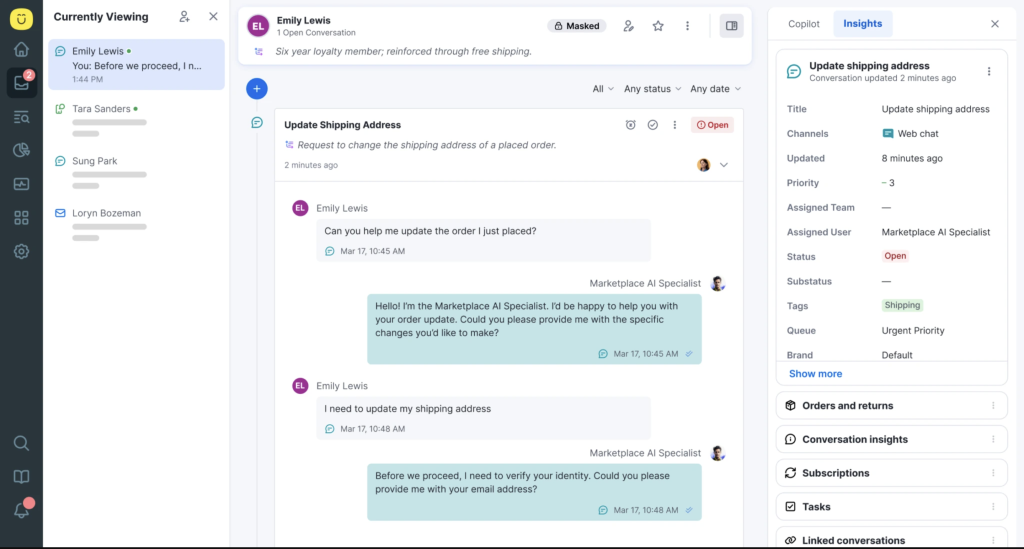
Key Features
- AI-driven workflows & routing: Automate repetitive tasks like tagging, triaging, and assigning tickets. Kustomer uses AI to route conversations to the right agent based on skills, priority, or customer type, so high-value or urgent issues get faster attention.
- Real-time dashboards (Team Pulse): Monitor live agent workloads, SLA performance, and backlog in one place. Managers can see which agents are overloaded and reassign conversations instantly.
- Custom objects & data modeling: Go beyond standard ticket fields by creating data objects tailored to your business – like subscriptions, warranties, or loyalty tiers. This makes it easy to store, search, and act on unique customer info directly inside the support platform.
- Proactive messaging: Use order status or customer behavior to trigger automatic outreach. For example, send a proactive update if a shipment is delayed, notify when a subscription is about to renew, or check in if a payment fails.
What users say about Kustomer
- “The search and tagging features are particularly useful.”
- “Customizing routing rules required more manual configuration than expected.”
- “The implementation process could have been more organized.”
Pricing
Kustomers offers the following pricing options:
- Enterprise: $89 per seat, per month
- Ultimate: $139 per seat, per month
- AI agents for customers: $0.60 per engaged conversation
- AI agents for reps: $40 per user per month
7. Intercom: In-app messaging and chatbot-driven Helpshift alternative
Intercom is a customer communication platform designed for businesses of various sizes. The tool helps in enhancing customer support through real-time messaging and various integrated channels, such as email and SMS.
As a Helpshift alternative, it stands out with rich customer engagement features: proactive nudges, behavioral triggers, and custom in-app announcements.
However, Intercom’s reporting capabilities are considered to be limited, posing challenges in generating comprehensive reports. The tool is also not particularly intuitive, which can hinder user experience and efficiency.
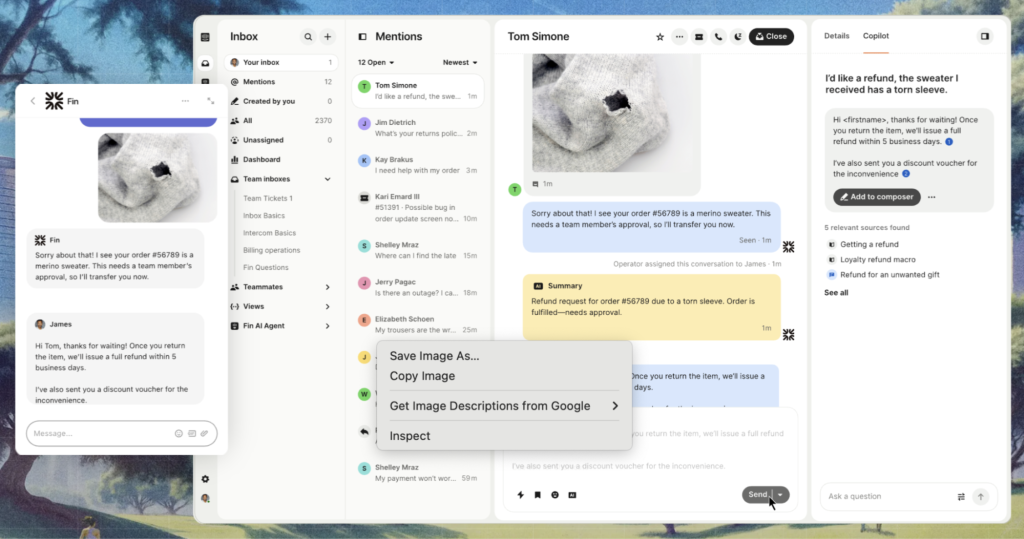
Key features
- AI chatbot (Fin): Intercom’s AI chatbot, Fin, is designed to decrease support volume and enhance team efficiency by automating customer interactions. Fin engages with customers the moment they initiate contact, providing immediate responses to common inquiries. The chatbot also assesses the complexity of customer queries. And, unlike human agents, Fin is available round the clock.
- Automation: Automate manual tasks such as routing and closing out conversations, and integrate with customer data for personalized experiences. Connect with various apps for automation across multiple platforms.
- Intercom messenger: This feature facilitates real-time, personalized customer interactions directly on websites and apps, enhancing user engagement. It seamlessly integrates with other features like the AI Inbox and Knowledge Base.
- Integration: The platform integrates with over 450 apps and supports building custom integrations with flexible APIs, Webhooks, and low-code options.
What users say about Intercom
- “Fin is great for reducing workload, handling issues that were quite laborious before.”
- “You can’t really customize Fin’s text formatting the way you want it.”
- “The team will occasionally release A/B testing without informing their users.”
Pricing
Intercom offers the following pricing plans:
- Essential: $29 per month per seat
- Advanced: $85 per month per seat
- Expert: from $132 per month per seat
- Fin AI Agent: $0.99 per Fin resolution (minimum 50 resolutions/month)
Recommended reading
8. Drift: Conversational sales-focused Helpshift alternative for B2B teams
Focused on real-time interactions, Drift aims to humanize digital experiences and foster stronger customer relationships. Its primary objective is to enhance the user experience on websites by providing immediate, personalized communication.
You can launch targeted in-chat experiences (e.g., upsell journeys or product recommendations) triggered by behaviors like repeated page visits – an edge beyond Helpshift’s support-only focus.
However, the tool may not be ideal for businesses that prefer traditional ticketing or email support due to its focus on real-time engagement. Some users find the setup of Drift to be time-consuming and challenging.
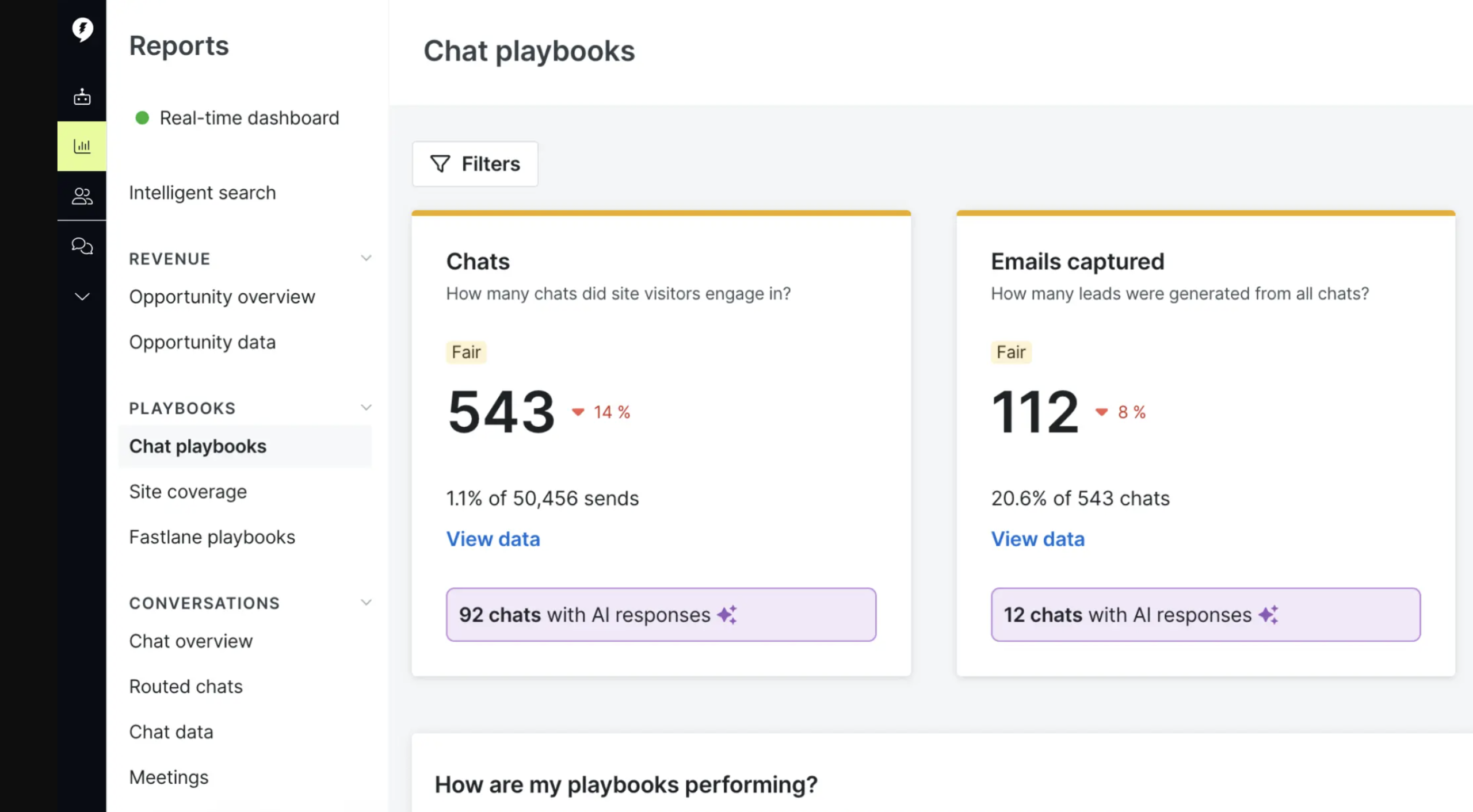
Key features
- Live chat: Allows real-time engagement with website visitors, providing instant answers and support.
- AI chatbots: Leverages AI technology to automate responses and guide visitors, reducing the load on human agents.
- Email playbooks: Automates email sequences based on user behavior, ensuring continuous engagement even when visitors are not on your site.
- Drift Engage: Personalized conversations with visitors, directing highly interested individuals to sales teams and nurturing others until they are ready to engage further.
- Account-based marketing: Targets high-value visitors with personalized interactions to increase conversion rates.
What users say about Drift
- “Offers an easy way to chat and book meetings with prospects!”
- “Sometimes I have the bot book a meeting for me that isn’t aligned to my territory.”
- “Very accurate way of tracking who is on your website, and what they are looking for.”
Pricing
Drift offers three types of pricing options:
- Premium: Starts at $2,500/month
- Advanced: Price on request
- Enterprise: Price on request
9. Freshdesk: Budget-friendly Helpshift alternative with automation and integrations
Freshdesk is a help desk software designed to streamline customer service across various channels such as email, social media, and more. It efficiently converts incoming queries into tickets and facilitates their allocation to the appropriate agents.
Freshdesk’s strength lies in gamification and internal scoring, making support teams accountable and motivated in ways Helpshift doesn’t offer out of the box.
However, users have faced challenges in syncing Freshdesk with Google Workspace products like Gmail, Google Calendar, and Google Contacts. New ticket alerts cannot be actioned directly within Gmail, requiring users to switch to Freshdesk’s platform.
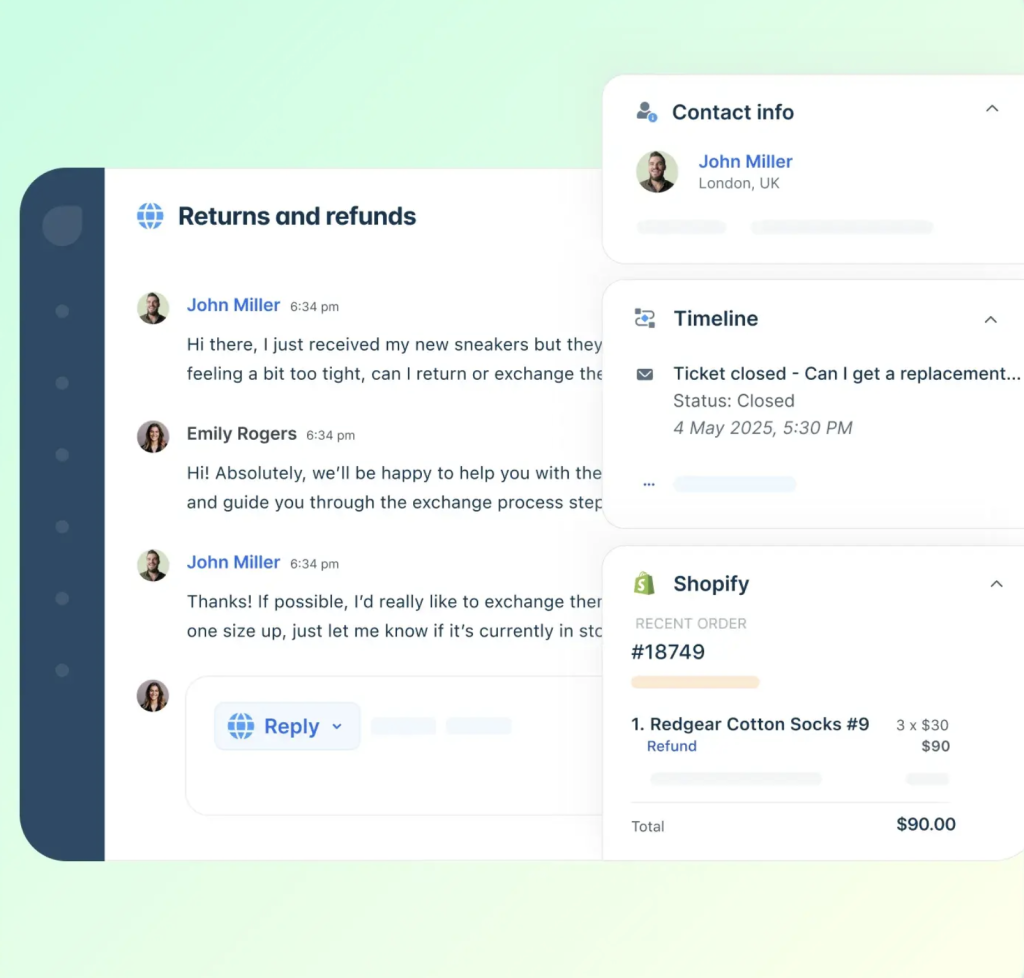
Key features
- Agent collision detection: Prevents simultaneous handling of the same ticket by multiple agents.
- Team inbox: Combines automated responses, self-service options, and analytics in a unified email communication hub. Agents can tailor their views for easy access to assigned tickets and tasks.
- Parent-child ticketing: Allows complex issues to be split into smaller tasks (child tickets) for distribution among various teams or agents, aiding in faster resolution.
- Ticket field suggester: Automatically suggests ticket fields for categorization, prioritization, and routing, enhancing efficiency and accuracy.
- Freddy AI: Freshdesk’s AI tool offers advanced support and productivity features, available on Pro and Enterprise plans.
What users say about Freshdesk
- “Freddy AI and its interface make the product much easier to use and understand.”
- “Confusing to build up a suite of products across Sales, Desk and Chat.“
- “Inability to open multiple tickets in separate tabs within Freshdesk.”
Pricing
Freshdesk offers the following pricing tiers:
- Free plan
- Growth: $15 per user per month
- Pro: $49 per user per month
- AI + Copilot: $78 per user per month
- Enterprise: $79 per user per month
Recommended reading
10. Salesforce Service Cloud: Customizable Helpshift alternative with deep CRM features
Salesforce Service Cloud is a comprehensive customer service and support software, part of the Salesforce suite of products. Built on the Salesforce Customer 360 Platform, Service Cloud facilitates seamless integration with other Salesforce products and leverages artificial intelligence through Salesforce Einstein.
Service Cloud taps into Salesforce’s entire 360° ecosystem – linking support with sales, marketing, and commerce data in a way Helpshift’s mobile-first model can’t match.
Despite its intuitive interface, the software is not well-suited for beginners due to its complexity and extensive features. There are challenges with getting notifications on sales deals and customer responses to closed tickets, and users have reported that the overall experience can be sluggish.
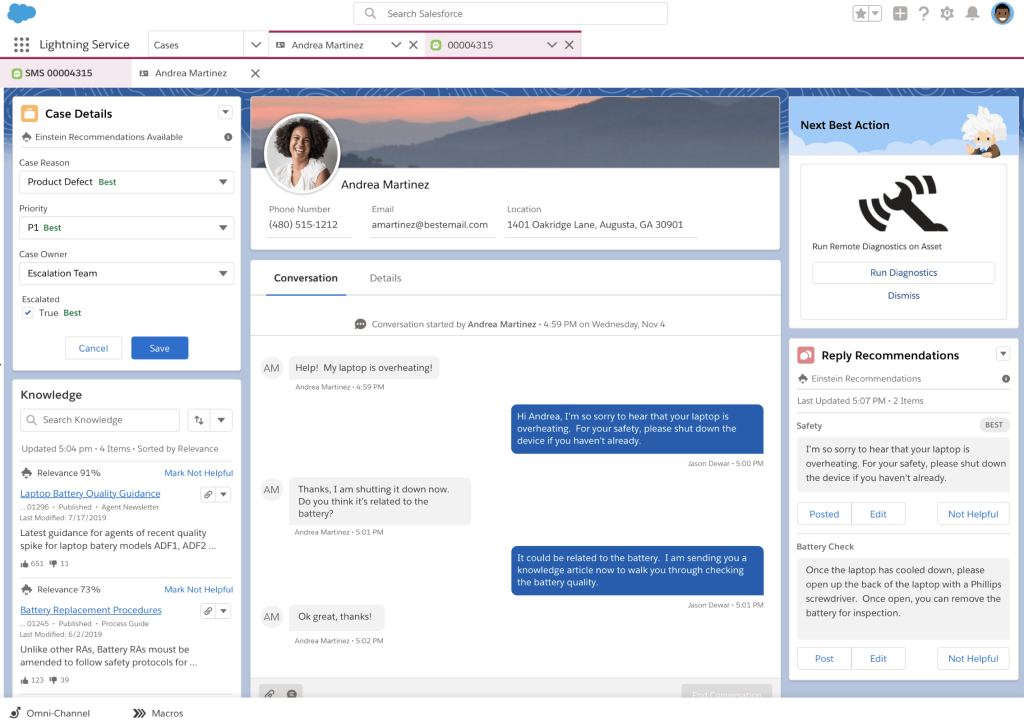
Key features
- Omnichannel support: Enables support teams to interact with customers across various channels, including phone, email, chat, social media, and SMS, all from a single platform.
- Knowledge base: Provides a comprehensive repository of information and resources that both customers and agents can access for quick problem resolution.
- Service analytics: Offers in-depth reporting and analytics tools to track key metrics such as response times, customer satisfaction, and agent performance, aiding in data-driven decision-making.
- Multi-lingual support: Supports over 30 languages, making it suitable for global operations and diverse customer bases.
What users say about Salesforce Service Cloud
- “It stands out for its powerful case management and automation capabilities.”
- “Performance can be slow during peak times or with complex configurations.”
- “The licensing and add-on pricing can be expensive for smaller teams.”
Pricing
Salesforce Service Cloud offers three types of pricing:
- Starter Suite: $25 per user/month
- Pro Suite: $100 per user/month
- Enterprise: $175 per user/month
Features to look for in Helpshift alternative
When evaluating Helpshift alternatives, it’s not enough to glance at pricing or a long feature list. The right tool should solve the same pain points that led you to Helpshift in the first place, and go beyond them. Here are the features worth paying close attention to:
1. In-app SDK and mobile support
Helpshift’s biggest draw is its mobile SDK, which lets companies embed support inside apps. If in-app chat is critical to your business, look for alternatives like Intercom, Zendesk, or Zoho Desk that still offer iOS/Android SDKs.
2. Multichannel coverage
Modern support isn’t confined to apps alone. Customers will reach out via email, live chat, WhatsApp, phone, or social channels. Choose an alternative that unifies these channels in one dashboard, so agents don’t waste time switching between tools.
3. AI and automation
AI is an absolute necessity now. Features like AI chatbots, automated triage, suggested replies, and predictive insights can help deflect repetitive queries, reduce resolution times, and keep teams efficient.
4. Collaboration tools
Customer queries often need input from more than one team. Look for features like shared inboxes, internal notes, shared drafts, and collision detection to make teamwork seamless.
5. Reporting and analytics
Helpshift offers basic insights, but scaling teams need deeper analytics. Dashboards for SLAs, agent productivity, and channel performance will help you spot trends and act faster.
6. Pricing model
One of the most common complaints about Helpshift is its issue-based pricing, which can make costs unpredictable. A good alternative should offer clear, scalable pricing that doesn’t penalize you as ticket volumes grow.
7. Ease of setup and adoption
Support tools only succeed if your agents actually enjoy using them. Platforms that mimic familiar workflows, or require minimal training, can save you weeks of onboarding time.
Select the right Helpshift alternative
Every Helpshift alternative in this list brings something different to the table. Zendesk and Salesforce Service Cloud are strong options if you’re running large, complex support operations. Kustomer stands out for ecommerce and DTC brands with its timeline view of customer history. And tools like Intercom and Zoho Desk shine when in-app or SDK-based support is non-negotiable.
But if your team is looking for a solution that balances power with simplicity, Hiver is the clear choice. Its inbox-like interface makes it effortless for teams to adopt, while features like shared inbox, AI copilots, automation, and analytics keep customer conversations organized. Unlike tools that demand steep setup or confusing pricing models, Hiver stays intuitive, affordable, and ready to scale with you.
👉 Start with Hiver today – it’s free for 7 days and built to make customer service feel collaborative, and not complicated.
Frequently asked questions (FAQs)
Why look for Helpshift alternatives?
Companies look for alternatives due to Helpshift’s issue-based pricing, limited multichannel coverage, SDK update challenges, and reliability concerns reported by users.
Which Helpshift alternatives support in-app SDKs?
Tools like Intercom, Zendesk, and Zoho Desk (via SalesIQ Mobilisten) provide in-app SDK support, making them the closest replacements to Helpshift’s native app experience.
What is the best Helpshift alternative for small teams?
For smaller teams, Help Scout, Hiver, or Freshdesk are popular choices thanks to their lower pricing, ease of use, and shared inbox-style workflows.
What is the best Helpshift alternative for enterprises?
Zendesk, Salesforce Service Cloud, and Kustomer are often preferred by larger organizations because of their scalability, CRM integrations, and advanced reporting.
Does Helpshift offer live chat for websites?
No, Helpshift focuses mainly on in-app support. For website live chat, alternatives like Intercom, Freshdesk, or LiveAgent are better suited.
Is Helpshift good for gaming companies?
Yes, Helpshift is popular with mobile gaming studios due to its in-app SDK and automation features. However, some gaming teams switch to Intercom or Zendesk for broader channel support and fewer SDK integration issues.
Which Helpshift alternatives are the easiest to set up?
Hiver and Help Scout are often cited as the easiest to adopt since they work like an inbox and don’t require heavy implementation.
 Skip to content
Skip to content






